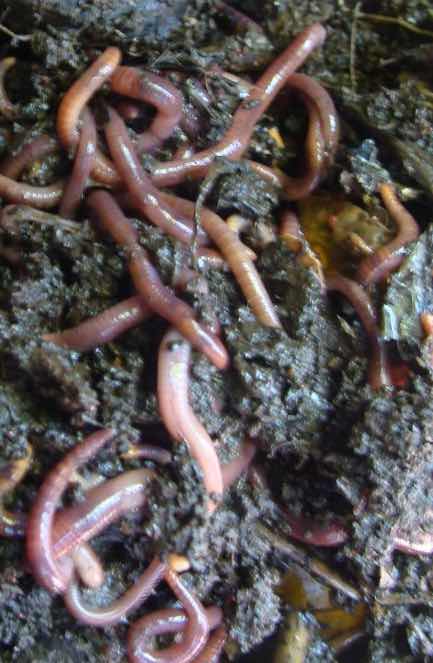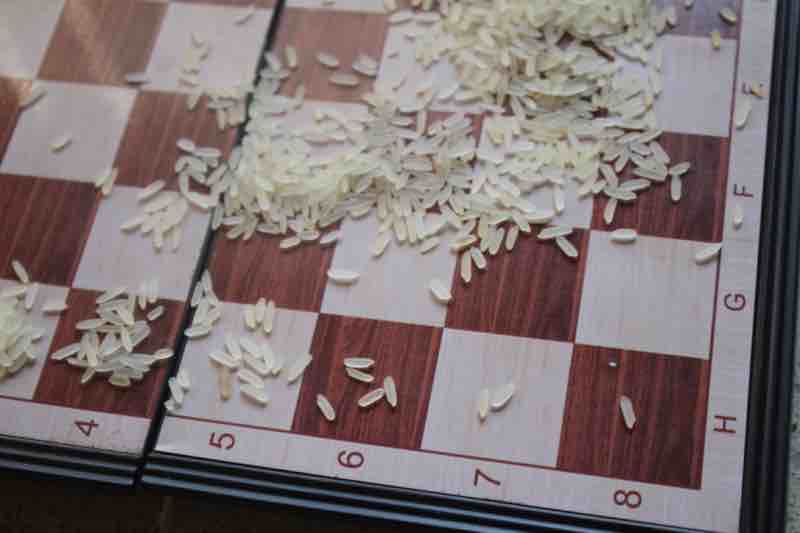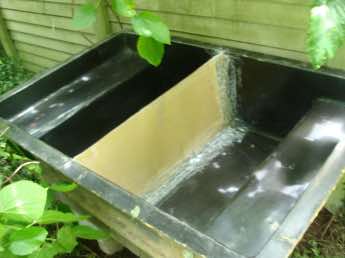- Bernard Preston homepage
- Our green kitchen
- Worm Farms and the Black Plague
Worm farms and the black plague
A connection between worm farms and the Black Plague may seem bizarre; but they are a good cost-effective way of preventing the spread of diseases in countries where garbage collection is improperly done.
Worm farms are at first thought, only for serious greenies but in fact they may be the remedy to a very serious social problem; the non-collection of garbage from poor areas unable to pay for services.
These little red nematodes have the incredible ability to turn your kitchen waste into magnificent humus and liquid manure. The organic gardener has the perennial problem of too few minerals but is unwilling to use chemical fertilisers. The solution is cow-dung, chicken litter and a wormery; a compost heap also, of course.

These red worms will eat their own weight of around a gram each day. So a thousand of them need a couple pounds of food daily. That could be potato-peels, rotten plums or uneaten rice; and even some meat, though generally anything cooked should be avoided. They love unfinished school sandwiches.
In short your worms will eat almost any leftovers from your kitchen, turning it into wonderful compost, rich in minerals; nitrogen is on the low side.

Red worms have one other amazing ability; they double in number every month.
After four weeks you will have 2000 worms; and 4,000 after two months. And how many would there be in a year?
Do you remember the Persian riddle about a grain of rice on the first square of a chessboard? The power of geometric progression yields the astonishing figure of a couple of tons of nematodes, to give them their scientific name, eating an equal weight of garbage every day.
These worms are unable to survive on our harsh African landscape, so they are not a threat to the environment; they will not become an invader-species. But they do love the compost heaps that abound in every greenie’s garden; handfuls of them get thrown in regularly.
All that is needed is a discarded double laundry-tub or bath. I bought an old mold that was no longer of any use to the owner; as large as you choose. Fit two standard outlets and set your worm farm up on blocks in the shade in the garden so you can collect the liquid in buckets.
chicken food
Here is one more thought; if you have chickens, the surplus worms provide a wonderful high protein food for your birds. At the rate they expand, you can toss the hens a handful every day.
But back to Sweetwaters where a Zulu friend tells me that the people are not planting mealies and pumpkins any more; they are devoured by an invasion of rats feeding predominantly on the uncollected kitchen-waste.
I enjoy the produce from my green garden but it is a luxury; for them it means starvation if they are unable to grow vegetables. Who is going to be the first to start a pilot plant of a dozen worm-farms?
Let us also not forget that it was this very rat that carried the flea
that was the vector for the bubonic-bacterium that devastated
Europe about 500 years ago. We are sitting on a time bomb just as
explosive as HIV. Prevention is better than a cure; worm farms and the black plague may be the solution that will avert yet another tragedy.
As I write we are under lock-down because of the coronavirus plague. It is not particularly irksome for gardeners in general. There are always broad beans or peas to be planted and worm farms to be attended to. I may be quite wrong and researchers will come up with the data in the future, but I suspect that greenies with strong immune systems will be far less prone to the disease.
Is it not interesting that up to a half of those with antibodies against Covid-19 never actually got sick? They fought off the disease without even knowing it. Blue Zone longevity confirms it; those who grow and eat their own food are far less likely to fall ill.
My own attack of the bug turned out to be a high temperature for three days, fatigue for two weeks followed by a complete return to wholesome living. The correct gut-lung connection and the coronavirus mean we have little to fear.
Food choices
Healthy food choices are getting rapidly worse the world over. Large companies strip the goodness from our nosh, feed the best parts to the pigs or sell them back to us at vast profit in supplements.
And then they offer us only ultra-refined meals at great profit to themselves; and diminishing health for us from food low in vitamins, fibre and minerals; and high in flavour enhancers, emulsifiers and preservatives.
Growing their own food is how the Blue Zone people get round it; one third of them live to a strong and vigorous ninety and ten times as many raise the flags to a healthy 100. Worm farms make a significant contribution to our gardening.
"Human judges can show mercy. But against the laws of nature, there is no appeal."
- Sir Arthur C. Clarke
Worm farms and the black plague

Worm farms and the black plague are one solution where garbage removal is ineffectively done; the rats that carry the fleas which bear the deadly bacteria flourish. Small outbreaks like that in Madagascar recently act as a reminder that being clean is next to godliness. We should dispose of our waste efficiently.
This small basic worm farm is a good place to start.
Are you still confused? Then perhaps what is a worm farm will clarify things for you.
Get them from the worm wizzard.
When browsing use right click and Open Link in New Tab, or you may get a bad gateway signal.
Newsletter
Our newsletter is entitled "create a cyan zone" at your home, preserving both yourself and Mother Earth for future generations; and the family too, of course. We promise not to spam you with daily emails promoting various products. You may get an occasional nudge to buy one of my books.
Here are the back issues.
- Lifestyle and ideal body weight
- What are ultra-processed foods?
- Investing in long-term health
- Diseases from plastic exposure
- Intensive lifestyle management for obesity has limited value
- A world largely devoid of Parkinson's Disease
- The impact of friendly bacteria in the tum on the prevention of cancer
- There's a hole in the bucket
- Everyone is talking about weight loss drugs
- Pull the sweet tooth
- If you suffer from heartburn plant a susu
- Refined maize meal and stunting
- Should agriculture and industry get priority for water and electricity?
- Nature is calling
- Mill your own flour
- Bake your own sourdough bread
- Microplastics from our water
- Alternative types of water storage
- Wear your clothes out
- Comfort foods
- Create a bee-friendly environment
- Go to bed slightly hungry
- Keep bees
- Blue zone folk are religious
- Reduce plastic waste
- Family is important
- What can go in compost?
- Grow broad beans for longevity
- Harvest and store sunshine
- Blue zone exercise
- Harvest and store your rainwater
- Create a cyan zone at your home
Did you find this page interesting? How about forwarding it to a friendly book or food junkie? Better still, a social media tick would help.
- Bernard Preston homepage
- Our green kitchen
- Worm Farms and the Black Plague
Address:
56 Groenekloof Rd,
Hilton, KZN
South Africa
Website:
https://www.bernard-preston.com